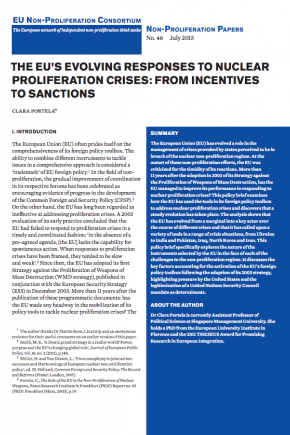The EU's Evolving Responses to Nuclear Proliferation Crises: From Incentives to Sanctions
The European Union (EU) has evolved a role in the management of crises provoked by states perceived to be in breach of the nuclear non-proliferation regime. At the outset of these non-proliferation efforts, the EU was criticized for the timidity of its reactions. More than 11 years after the adoption in 2003 of its Strategy against the Proliferation of Weapons of Mass Destruction, has the EU managed to improve its performance in responding to nuclear proliferation crises?
This policy brief examines how the EU has used the tools in its foreign policy toolbox to address nuclear proliferation crises and discovers that a steady evolution has taken place. The analysis shows that the EU has evolved from a marginal into a key actor over the course of different crises and that it has called upon a variety of tools in a range of crisis situations, from Ukraine to India and Pakistan, Iraq, North Korea and Iran. This policy brief specifically explores the nature of the instruments selected by the EU in the face of each of the challenges to the non-proliferation regime. It discusses the key factors accounting for the activation of the EU’s foreign policy toolbox following the adoption of its 2003 strategy, highlighting pressure by the United States and the legitimization of a United Nations Security Council mandate as determinants.

